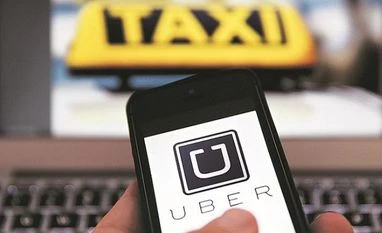By Tina Bellon and Akanksha Rana
NEW YORK (Reuters) - Uber Technologies Inc on Wednesday posted a narrower loss as its ride-hail and delivery businesses rebounded slightly from pandemic lows, and the company said it was well on track to reach its goal of achieving an adjusted profit by year-end.
Uber said customers in cities' outer boroughs and suburbs had returned to its rides platform during the quarter.
Nearly complete recoveries in markets including Brazil and Australia point to leisure travel to restaurants and cultural events bouncing back quickly once the pandemic ends, with business travel returning more slowly, as many employees continue to work from home.
Shares fell 3% in after-hours trading after gaining around 6% during the day. Shares had risen after smaller ride-hail rival Lyft Inc said on Tuesday it might become profitable during the third quarter, three months ahead of a previous goal, thanks to a rebound and cost cuts.
Uber reported a loss on an adjusted basis before interest, taxes, depreciation and amortization of $454 million, significantly less than analysts' average expectations for a $514 million loss, according to Refinitiv data.
More From This Section
Uber cut costs throughout 2020, including reducing staff by nearly 30% from the beginning of the year. A focus on its core rides and food delivery business and divestments of ancillary units will allow Uber to emerge from the pandemic a slimmer company.
Adjusted EBITDA, which excludes the cost of the company's extensive stock-based compensation and other potentially significant items, is the profitability metric Uber uses.
Uber reported $3.17 billion in total revenue in the months from October through December.
Fourth-quarter mobility revenue, largely comprised of rides, declined by 52% from last year, but at $1.47 billion was up 8% on a quarterly basis despite new lockdown measures in the United States, Europe and the Middle East.
The company said it could not predict the quarter in which ride-hail volumes might return to pre-pandemic levels. Airport travel, which made up 15% of gross bookings before the pandemic, will take longer to return than leisure and business trips, Uber said.
It expected first-quarter adjusted EBITDA to be flat or down compared with the fourth quarter.
Orders at Uber's food delivery platform, Uber Eats, further grew during the fourth quarter, as many countries and U.S. states issued new lockdown orders, closing restaurants and prompting many people to order in.
Delivery revenue more than tripled from last year and at around $1.36 billion, grew 19% compared with the third quarter.
Uber has expanded its footprint in the competitive space and acquired smaller food-delivery rival Postmates for $2.65 billion and alcoholic beverage delivery service Drizly for $1.1 billion.
Both deals were largely stock-based, with the Drizly deal expected to close later this year.
Uber also said it had further lowered costs in the fourth quarter, with total costs and expenses dropping 14% in that period.
Following a directive by Chief Executive Dara Khosrowshahi to focus on the company's core businesses, Uber has sold two cash-burning units.
The company in December sold its self-driving Advanced Technologies Group (ATG) in a $4 billion equity deal at a steep drop in valuation. Khosrowshahi at the time said the deal would accelerate Uber's profitability goal.
The same month, Uber also handed over the keys to its air taxi business Elevate, without disclosing the terms of the deal.
(Reporting by Tina Bellon in New York and Akanksha Rana in Bangalore; Editing by Peter Henderson and Matthew Lewis)
)